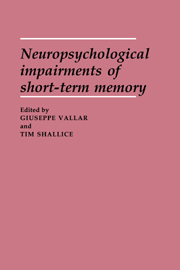Book contents
- Frontmatter
- Contents
- List of contributors
- Acknowledgments
- General introduction
- I THE FUNCTIONAL ARCHITECTURE OF AUDITORY–VERBAL (PHONOLOGICAL) SHORT-TERM MEMORY AND ITS NEURAL CORRELATES
- II PHONOLOGICAL SHORT-TERM MEMORY AND OTHER LEVELS OF INFORMATION PROCESSING: STUDIES IN BRAIN-DAMAGED PATIENTS WITH DEFECTIVE PHONOLOGICAL MEMORY
- III SHORT-TERM MEMORY STUDIES IN DIFFERENT POPULATIONS (CHILDREN, ELDERLY, AMNESICS) AND OF DIFFERENT SHORT-TERM MEMORY SYSTEMS
- 9 Developmental fractionation of working memory
- 10 Adult age differences in working memory
- 11 Lipreading, neuropsychology, and immediate memory
- 12 Memory without rehearsal
- 13 The extended present: evidence from time estimation by amnesics and normals
- IV PHONOLOGICAL SHORT-TERM MEMORY AND SENTENCE COMPREHENSION
- Name index
- Subject index
12 - Memory without rehearsal
Published online by Cambridge University Press: 11 May 2010
- Frontmatter
- Contents
- List of contributors
- Acknowledgments
- General introduction
- I THE FUNCTIONAL ARCHITECTURE OF AUDITORY–VERBAL (PHONOLOGICAL) SHORT-TERM MEMORY AND ITS NEURAL CORRELATES
- II PHONOLOGICAL SHORT-TERM MEMORY AND OTHER LEVELS OF INFORMATION PROCESSING: STUDIES IN BRAIN-DAMAGED PATIENTS WITH DEFECTIVE PHONOLOGICAL MEMORY
- III SHORT-TERM MEMORY STUDIES IN DIFFERENT POPULATIONS (CHILDREN, ELDERLY, AMNESICS) AND OF DIFFERENT SHORT-TERM MEMORY SYSTEMS
- 9 Developmental fractionation of working memory
- 10 Adult age differences in working memory
- 11 Lipreading, neuropsychology, and immediate memory
- 12 Memory without rehearsal
- 13 The extended present: evidence from time estimation by amnesics and normals
- IV PHONOLOGICAL SHORT-TERM MEMORY AND SENTENCE COMPREHENSION
- Name index
- Subject index
Summary
Introduction
It is widely accepted that rehearsal plays an important role in short-term recall, but the nature of that role is much less clear. Evidence for the functions of rehearsal has come from two different areas; the first involves experiments in normal subjects that investigate the effects of dual tasks such as concurrent articulation of irrelevant material (“articulatory suppression”; see, e.g., Baddeley, Lewis, & Vallar, 1984) or counting (e.g., Peterson & Peterson, 1959), which are assumed to interfere with rehearsal. However, the interpretation of these kinds of studies is problematic; the dual task may interfere with cognitive and mnestic functions other than the process of rehearsal, or rehearsal may continue to be performed despite the dual task. It is impossible to show a priori that the dual task employed interferes only with rehearsal; a circularity is unavoidable.
The second general strand of evidence on the importance of rehearsal comes from studies of patients with developmental or acquired disorders of short-term memory or articulation. Here, too, a degree of logical circularity seems hard to avoid. Vallar and Baddeley (1984a, b), for instance, report data from a patient, PV, with restricted shortterm memory span. They show that in recall PV behaves as they expect a patient who cannot rehearse would behave, but note that they have no independent evidence that rehearsal processes are impaired. Indeed, Baddeley (1986) suggests that PV could rehearse if she chose; she does not do so because rehearsal cannot be used to “refresh” a defective phonological memory store. Other investigators have examined memory processes in patients whose articulatory processes are disrupted by congenital or acquired anarthria (e.g., Baddeley & Wilson, 1985; Bishop, 1985; Vallar & Cappa, 1987).
- Type
- Chapter
- Information
- Neuropsychological Impairments of Short-Term Memory , pp. 287 - 318Publisher: Cambridge University PressPrint publication year: 1990
- 33
- Cited by



